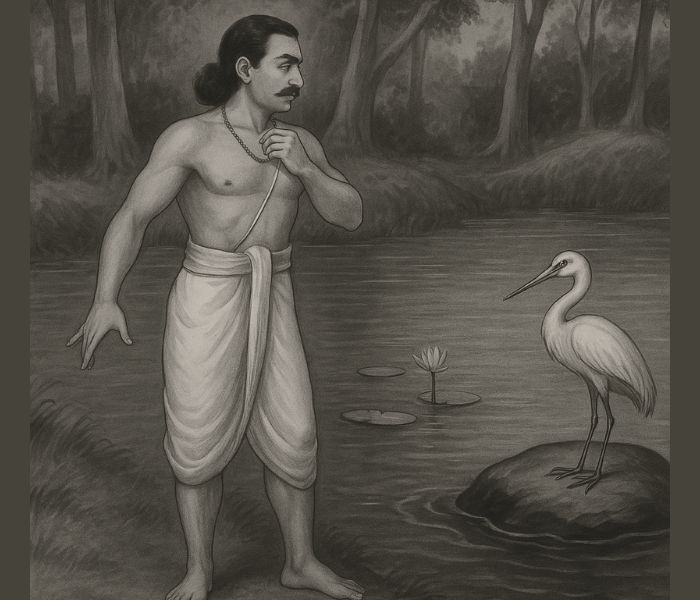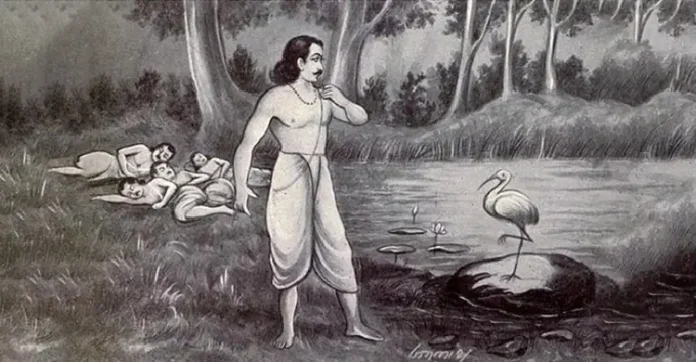Deep within the heart of the Mahabharata lies a quiet yet profound episode—Yaksha Prashna —a moment where silence meets wisdom, and survival rests on the edge of truth. In the stillness of a forest lake, amidst the exile of the Pandavas, unfolds a dialogue unlike any other—between a mortal prince and a mysterious celestial being.
When the valiant Pandava brothers fall unconscious one by one in their quest for water, it is Yudhishthira, the epitome of righteousness, who faces the challenge not with weapons, but with wit, wisdom, and unwavering dharma.
A Yaksha, the guardian of the lake, poses a series of questions—enigmatic, philosophical, and eternal. These are not mere riddles, but reflections of life’s deepest truths.
This legendary episode, known as Yaksha Prashna in Mahabharata, is a timeless treasure trove of ethical dilemmas, spiritual insights, and moral clarity. Through the Yaksha Prashna questions and answers, we are invited to pause and ponder: What is the greatest wonder of life? What brings true happiness? What is the duty of a human being?
What is Yaksha Prashna?
Yaksha Prashna is a famous episode from the Mahabharata, where a divine being, the Yaksha, poses a series of deep philosophical questions to Yudhishthira, the eldest Pandava. Known for his wisdom and unwavering sense of dharma, Yudhishthira answers each question with calm clarity.
The Yaksha Prashna’s meaning lies in testing righteousness, intellect, and spiritual insight. This episode is also called the Dharma Baka Upakhyan and showcases timeless moral lessons. The encounter between Yaksha and Yudhishthira has become symbolic of the eternal quest for truth, virtue, and self-realization in the face of crisis.
The Story of Yaksha and Yudhishthira
During their exile in the forest, the Pandavas—Yudhishthira, Bhima, Arjuna, Nakula, and Sahadeva—were once wandering through the woods in search of food and water. One hot afternoon, exhausted and parched, they found themselves desperate for drinking water.
Yudhishthira asked Nakula to climb a tree and look for a water source. Spotting a shimmering lake nearby, Nakula was sent to fetch water. However, as soon as he bent down to drink, a voice echoed through the air.
It was a Yaksha, the guardian spirit of the lake, who warned him, “Answer my questions before you drink, or you shall face death.” Ignoring the warning, Nakula drank the water and collapsed.
Worried by the delay, Yudhishthira sent Sahadeva, then Arjuna, and finally Bhima—each met the same fate as Nakula after defying the Yaksha’s condition.
Left alone, Yudhishthira himself approached the lake. Seeing his brothers lying motionless, he was filled with sorrow, but did not act in haste. As he prepared to drink, the Yaksha in Mahabharata appeared and repeated his demand.
Yudhishthira respectfully agreed to answer. What followed was a series of profound questions from the Yaksha, testing his understanding of life, duty, humility, and truth. Unlike his brothers, Yudhishthira chose patience, wisdom, and surrender to dharma.
Impressed by his answers, the Yaksha revealed himself as Yama, the god of death and Yudhishthira’s celestial father. As a reward for his righteousness, he revived all four Pandava brothers.
This sacred encounter between Yaksha and Yudhishthira not only saved lives but also gifted humanity one of the richest collections of ethical and philosophical teachings.

Top Trending Content on hellomyyoga:
Yaksha Prashna Questions and Answers
The most captivating part of the Yaksha Prashna in Mahabharata lies in the dialogue—a profound question-and-answer conversation between the Yaksha and Yudhishthira.
The Yaksha Prashna questions and answers cover a wide range of themes: life, death, dharma, truth, humility, and human nature.
1. Yaksha: What is the greatest wonder in the world?
Yudhishthira: “Day after day, countless beings die. Yet, the living believe they are immortal. This is the greatest wonder.”
This answer reflects the human tendency to ignore the inevitability of death and live in illusion.
2. Yaksha: What is the path to true happiness?
Yudhishthira: “Contentment is the highest happiness.”
In an age of desire and greed, Yudhishthira emphasizes satisfaction with what one has.
3. Yaksha: What is the most valuable possession of a person?
Yudhishthira: “Learning is the most valuable possession, for it cannot be stolen.”
This answer highlights the importance of knowledge over material wealth.
4. Yaksha: Who is truly alive, even among the living?
Yudhishthira: “He who practices dharma and truth is truly alive.”
A reminder that mere existence is not life—righteous conduct defines true living.
5. Yaksha: Who is a real friend?
Yudhishthira: “One who prevents you from walking the path of evil is a true friend.”
Friendship here is not about support in pleasure, but guidance in virtue.
6. Yaksha: What is faster than the wind?
Yudhishthira: “The mind is faster than the wind.”
A poetic truth about the power and speed of human thought.
7. Yaksha: What is the best duty of a human being?
Yudhishthira: “To perform one’s responsibilities according to dharma.”
This reflects the core of Indian philosophy—duty above desire.
8. Yaksha: What is the root of religion, wealth, and happiness?
Yudhishthira: “Dharma is the foundation of all three.”
Yudhishthira upholds righteousness as the basis of a meaningful life.
9. Yaksha: Who is truly wise?
Yudhishthira: “He who distinguishes between right and wrong, and follows the path of righteousness, is truly wise.”
Wisdom is not in intellect alone, but in moral judgment.
10. Yaksha: Whose victory never declines?
Yudhishthira: “The victory of the self-controlled never declines.”
Victory over oneself is the greatest and most lasting.
11. Yaksha: What is more important than the earth itself?
Yudhishthira: “One’s mother.”
This answer honors the mother as the source of life and nurturing, even greater than the earth that sustains us.
12. Yaksha: What is higher than heaven?
Yudhishthira: “One’s father.”
Heaven is a reward, but a father is a living guide—provider of knowledge, protection, and dharma.
13. Yaksha: What is swifter than the wind?
Yudhishthira: “The mind.”
The mind travels across time, space, and imagination in a moment—faster than any physical force.
Also Read: Powerful Sanskrit Words
14. Yaksha: What is more numerous than the blades of grass?
Yudhishthira: “The thoughts in the mind.”
This captures the nature of the restless human mind—constantly churning with thoughts, desires, and emotions.
15. Yaksha: What is the highest sanctuary of dharma?
Yudhishthira: “Liberality.”
True dharma lies in generosity—giving without expectation, and sharing from a place of abundance.
16. Yaksha: What is the highest sanctuary of fame?
Yudhishthira: “A gift.”
It is through selfless giving and kindness that one earns lasting respect and honor.
17. Yaksha: What is the highest sanctuary of heaven?
Yudhishthira: “Truth.”
Heaven is not earned by rituals alone, but through unwavering truthfulness and moral living.
18. Yaksha: What is the most praiseworthy thing of all?
Yudhishthira: “Skill.”
A skilled person contributes meaningfully to society and is remembered with admiration.
19. Yaksha: What is the most valuable possession?
Yudhishthira: “Knowledge.”
Unlike wealth, knowledge grows with sharing and stays even when everything else is lost.
20. Yaksha: What is the greatest treasure?
Yudhishthira: “Health.”
Health is the foundation of all achievements—without it, life’s joys and duties become burdens.
In a world of endless desires, true peace lies in being content with what one has.
21. Yaksha: What is the highest dharma?
Yudhishthira: “To injure none of the living.”
Ahimsa (non-violence) is upheld as the highest form of dharma—respect for all life is the root of righteousness.
Must Read: Top Bhagavad Gita Slokas
22. Yaksha: What must be controlled?
Yudhishthira: “The mind.”
True control is not over others but over one’s own thoughts and emotions.
23. Yaksha: What must be renounced to become agreeable?
Yudhishthira: “Pride.”
Humility is the key to building meaningful and peaceful relationships.
24. Yaksha: What must be renounced to become wealthy?
Yudhishthira: “Desire.”
Contentment makes one feel truly rich, even without possessions.
25. Yaksha: What can be renounced without regret?
Yudhishthira: “Anger.”
Letting go of anger frees the heart from pain and the mind from chaos.
26. Yaksha: What must be relinquished to gain happiness?
Yudhishthira: “Greed.”
Greed blinds us to the joys of what we already have.
27. Yaksha: What makes the way?
Yudhishthira: “The good make the way; indeed, they are the way.”
The path of virtue is not built—it is walked by the righteous.
28. Yaksha: Who is an ascetic?
Yudhishthira: “He who remains faithful.”
True asceticism lies in unwavering devotion, not external appearance.
29. Yaksha: What is true restraint?
Yudhishthira: “Restraint of the mind.”
Controlling thoughts is the highest form of self-discipline.
30. Yaksha: What is true forgiveness?
Yudhishthira: “He who endures enmity truly forgives.”
Forgiveness is not forgetting—but letting go with grace.
31. Yaksha: What is real knowledge?
Yudhishthira: “Knowledge of God.”
Spiritual awareness is the highest wisdom.
32. Yaksha: What is tranquility?
Yudhishthira: “When the heart is still.”
Peace is not external; it’s a calm mind and a content heart.
33. Yaksha: What is mercy?
Yudhishthira: “When one desires the happiness of all creatures.”
Compassion goes beyond kindness—it’s wishing well for all beings.
34. Yaksha: What is simplicity?
Yudhishthira: “When the heart is tranquil.”
A peaceful heart leads to a simple, meaningful life.
35. Yaksha: What is the invincible enemy?
Yudhishthira: “Anger.”
Anger destroys judgment, peace, and relationships—it’s the true inner foe.
36. Yaksha: What disease has no cure?
Yudhishthira: “Covetousness.”
Desire without end is the root of all suffering.
37. Yaksha: Who is the honest man?
Yudhishthira: “He who desires the happiness of all the living.”
38. Yaksha: Who is the dishonest man?
Yudhishthira: “The one who has no mercy.”
Must Know: 108 Names of Lord Shiva
39. Yaksha: What is ignorance?
Yudhishthira: “Not knowing one’s Dharma.”
40. Yaksha: What is pride?
Yudhishthira: “When a man believes he is the sole doer of life.”
41. Yaksha: What is grief?
Yudhishthira: “Only ignorance.”
42. Yaksha: How does a man become patient?
Yudhishthira: “By subduing his senses.”
43. Yaksha: What is the true ablution?
Yudhishthira: “When the heart is washed clean.”
44. Yaksha: What is charity?
Yudhishthira: “Protecting all creatures.”
45. Yaksha: What is wickedness?
Yudhishthira: “Speaking ill of others.”
46. Yaksha: How is a man agreeable?
Yudhishthira: “When he speaks agreeably.”
47. Yaksha: How does he get what he wants?
Yudhishthira: “By acting with discernment.”
48. Yaksha: How does one find bliss in the next world?
Yudhishthira: “By being virtuous in this one.”
49. Yaksha: What is truly amazing in this world?
Yudhishthira: “That though humans are mortal, everyone lives as though they are immortal.”
50. Yaksha: What is the news? Who is the real man?
Yudhishthira: “One’s good deeds echo to heaven and spread across the earth. As long as those deeds last, so does one’s legacy. That is a real man.”
51. Yaksha: Who has every kind of wealth?
Yudhishthira: “He to whom joy and sorrow, gain and loss, past and future are all the same.”
This is the ultimate yogi—one who is untouched by extremes.
Meditation Topics for You:
Yaksha’s Final Test & Reward
Moved beyond words, the Yaksha, who is none other than Yama, offers Yudhishthira the chance to choose one brother to revive.
Yaksha: Whom shall I revive?
Yudhishthira: “Revive Nakula.”
Yaksha: Why not Bhima or Arjuna?
Yudhishthira: “I, Kunti’s son, live. Let Madri, too, have a living son. Let dharma be upheld equally.”
Impressed by Yudhishthira’s fairness and nobility, Yama declares:
“You are the wisest and most righteous man on Earth. I restore the life of all your brothers.”
Lessons From Yaksha Prashna For Modern Life
Though rooted in ancient scripture, the wisdom of Yaksha Prashna in Mahabharata holds timeless relevance. The philosophical questions posed by the Yaksha and Yudhishthira’s calm, thoughtful answers resonate deeply with the dilemmas and challenges we face in the modern world.
Facing Ethical Dilemmas at Work and Life
Just like Yudhishthira chose dharma over personal gain, we are often faced with decisions where values clash with convenience. Whether it’s choosing honesty over profit or fairness over favoritism, moral clarity remains our guiding light.
✅ Lesson: Do what is right, not what is easy.
Dealing with Uncertainty and Crisis
In an age of global pandemics, economic volatility, and personal stress, Yudhishthira’s composed behavior under extreme pressure teaches us emotional intelligence, resilience, and patience.
✅ Lesson: Stay calm, think clearly, and respond with wisdom—not fear.
Mindfulness About Mortality
When Yudhishthira said the greatest wonder is that we live as if we’re immortal, he pointed to a truth we often ignore. In our fast-paced lives, we forget how fragile and temporary life is.
✅ Lesson: Cherish life, live meaningfully, and prioritize what truly matters.
True Friendship and Relationships
In an era dominated by superficial social media connections, Yaksha’s question “Who is a true friend?” reminds us that genuine friendship is about guiding each other toward goodness, not just sharing laughter.
✅ Lesson: Nurture relationships that help you grow morally and spiritually.
Self-Mastery in the Age of Distraction
Yudhishthira’s emphasis on conquering the self is especially relevant in a world overflowing with temptations, scrolling habits, and instant gratification.
✅ Lesson: Mastering your mind is more powerful than mastering machines.
Contentment Amidst Consumerism
“Contentment is true happiness” said Yudhishthira. In today’s world of endless desires and comparisons, this message hits home.
✅ Lesson: True joy comes from within, not from wealth or possessions.
Leadership with Values
For leaders, managers, and decision-makers, Yudhishthira stands as a role model—leading not by power, but by principle.
✅ Lesson: Ethical leadership builds trust and lasting success.
Read Here: Hanuman Chalisa in English
FAQs About Yaksha Prashna
It appears in the Aranya Parva (Book of the Forest), during the Pandavas’ exile.
The Yaksha is later revealed to be Yama, the god of death and righteousness, and Yudhishthira’s celestial father.
“Yaksha Prashna” literally means “Questions of the Yaksha.” It refers to a dialogue where a Yaksha tests Yudhishthira’s wisdom through deep questions.
To test his wisdom, dharma, and moral strength before allowing him to revive his brothers.
Yaksha is said to have asked around 124 questions, but most versions highlight 30-50 key ones.
Bhima, Arjuna, Nakula, and Sahadeva.
To maintain fairness between his two mothers—Kunti and Madri—so both could have a surviving son.
“The greatest wonder is that people die every day, yet the living think they will live forever.”
It teaches values like dharma, contentment, truth, self-control, humility, and awareness of mortality.
Questions related to life, death, happiness, truth, dharma, friendship, and the nature of reality.
Yudhishthira says the self-controlled are truly victorious, highlighting the importance of inner discipline.
It promotes ethical leadership based on fairness, wisdom, and dharma rather than authority or might.
It teaches the value of fairness, balance in relationships, and selfless choices.
Because it addresses eternal human questions and provides clear, wise, and balanced answers that apply to all ages.
Yoga Information:
Yoga for Health:
| Yoga for High Blood Pressure | Yoga for Anxiety | Yoga for Metabolic Syndrome |
| Yoga for Bipolar Disorder | Yoga for Endometriosis | Yoga for Lower Back Pain |
| Yoga for Depression | Yoga During Periods | Yoga for PCOD |
Ayurveda Content to Read:
Important Mental Health Content For You:
Explore by Topics:
Pranayama Information:



